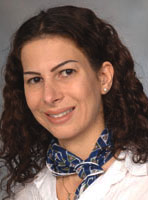Go to
Farinaz Koushanfar
Physical proof-based protocols for the IoT era: Securing medical devices case study
Securing Internet of things (IoT) is a grand challenge for emerging applications. On the one hand, the small device form factors, resources and constraints, prohibit running intensive security and cryptography algorithms on these devices. On the other hand, physical accessibility of the devices introduces a wide attack surface on the security protocol and the keys, ranging from remote attacks on the wireless interface, to side-channels and physical attacks, as well as new sensor-based vulnerabilities.
In this talk I argue that by bootstrapping physical aspects of the IoT, one can address one of the most critical aspects of IoT security, namely key management (including but not limited to key generation, storage and exchange). For example, variations in the physical substance can be used as unique unclonable keys for the devices, while the randomness in transient connections in the physical layer and multi-factor authentications based on the location and time can be leveraged for key agreement without a prior trust establishment. Proof-of-concept implementation of such proofs of physical presence are given on a physics-based transient secure key agreement protocol that we have devised for protecting implantable medical devices without changing the hardware.
About the panel speaker:

Farinaz Koushanfar is a professor and Henry Booker Faculty Scholar of Electrical and Computer Engineering (ECE) in University of California, San Diego (UCSD) where she directs the Adaptive Computing and Embedded Systems (ACES) Lab. Dr. Koushanfar’s research interests include embedded and cyber-physical systems security, design and optimization of embedded systems, design automation (DA), and in particular DA of domain-specific/mobile computing and machine learning applications. Professor Koushanfar serves as an associate partner of the Intel Collaborative Research Institute for Secure Computing to aid developing solutions for the next generation of embedded secure devices; she is the founder of Women ExCEl and a co-founder of the Trust-Hub.
Secondary navigation
- EPFL Workshop on Logic Synthesis and Emerging Technologies
- Luca Amaru
- Luca Benini
- Giovanni De Micheli
- Srini Devadas
- Antun Domic
- Rolf Drechsler
- Pierre-Emmanuel Gaillardon
- Jie-Hong Roland Jiang
- Akash Kumar
- Shahar Kvatinsky
- Yusuf Leblebici
- Shin-ichi Minato
- Alan Mishchenko
- Vijaykrishnan Narayanan
- Ian O'Connor
- Andre Inacio Reis
- Martin Roetteler
- Julien Ryckaert
- Mathias Soeken
- Christof Teuscher
- Zhiru Zhang
- Symposium on Emerging Trends in Computing
- Layout synthesis: A golden DA topic
- EPFL Workshop on Logic Synthesis & Verification
- Luca Amaru
- Luca Benini
- Robert Brayton
- Maciej Ciesielski
- Valentina Ciriani
- Jovanka Ciric-Vujkovic
- Jason Cong
- Jordi Cortadella
- Giovanni De Micheli
- Antun Domic
- Rolf Drechsler
- Henri Fraisse
- Paolo Ienne
- Viktor Kuncak
- Enrico Macii
- Igor Markov
- Steven M. Nowick
- Tsutomu Sasao
- Alena Simalatsar
- Leon Stok
- Dirk Stroobandt
- Tiziano Villa
- Symposium on Emerging Trends in Electronics
- Raul Camposano
- Anantha Chandrakasan
- Jo De Boeck
- Gerhard Fettweis
- Steve Furber
- Philippe Magarshack
- Takayasu Sakurai
- Alberto Sangiovanni-Vincentelli
- Ken Shepard
- VENUE
- Panel on Circuits in Emerging Nanotechnologies
- Panel on Emerging Methods of Computing
- Panel on The Role of Universities in the Emerging ICT World
- Panel on Design Challenges Ahead
- Panel on Alternative Use of Silicon
- Nano-Bio Technologies for Lab-on-Chip
- Functionality-Enhanced Devices Workshop
- More Moore: Designing Ultra-Complex System-on-Chips
- Design Technologies for a New Era
- Nanotechnology for Health
- Secure Systems Design
- Surface Treatments and Biochip Sensors
- Security/Privacy of IMDs
- Nanosystem Design and Variability
- Past Events Archive

